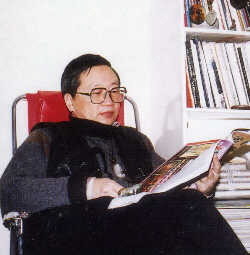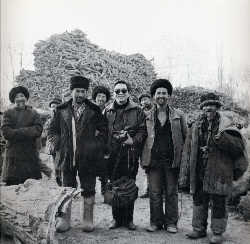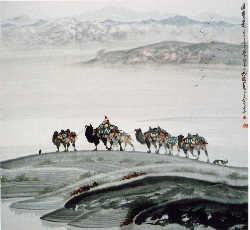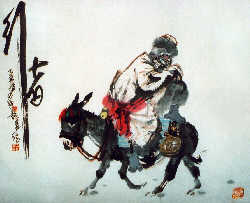| Art Q&A > Painting |
|
|
Lei Zhongxun, a painter of the West Regions As a very innovative painter, Lei Zhongxun is known for his paintings with Xinjiang as the theme. His humorous and unique painting style suits both refined and popular tastes. Critics note that Lei's works "emits the flavor of a real, indigenous, and truthful Xinjiang."
Lei Zhongxun was born in Huaiyang Country of Central China's Henan Province in 1943, and served as a scene designer in the Ensemble of Xinjiang Production and Construction Corps in 1959. Lei has published a number of works of traditional Chinese paintings, engravings, and picture-story books in domestic newspapers and periodicals since 1961.
Lei pursued further studies in Shanghai Drama College's Department of Stage Arts in 1977. He became an artistic editor of the Xinjiang Literature and Art Association's periodical "Western Literature of China" in 1979. Upon invitations, Lei visited Hong Kong in 1989 as well as Bishkek and Moscow of the former Soviet Union in 1990.
In 1993, Lei held his first personal exhibition -- Lei Zhongxun's Works of Traditional Chinese Painting -- and published his first painting album, Great Rejoicing in the Western Regions in Hong Kong. In the same year, he resigned from his post of artistic editor, contributing all his energy in painting. In 1997, another album, Lei Zhongxun's Selected Works of Traditional Chinese Painting, was published in Hong Kong.
Currently, Lei Zhongxun is the artistic advisor of the Research Institute of Culture and History of the Xinjiang Regional Government as well as a member of the Chinese Artists Association. In 2005, the China Painting Artists Association appraised Lei as one of the "100 Most-distinguished Painters in China." Address: Xinjiang Literature and Art Association |
||
All rights reserved. Reproduction of text for non-commercial purposes is permitted provided that both the source and author are acknowledged and a notifying email is sent to us. |
||
 |



